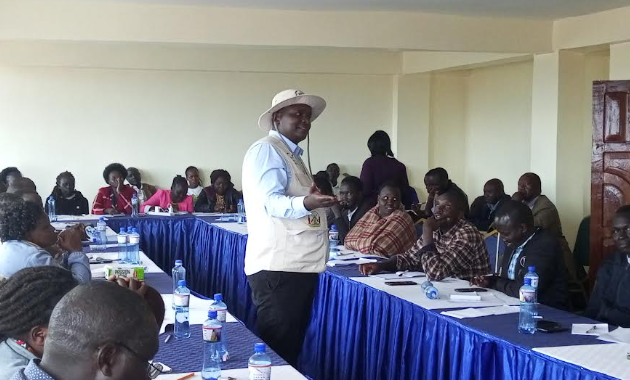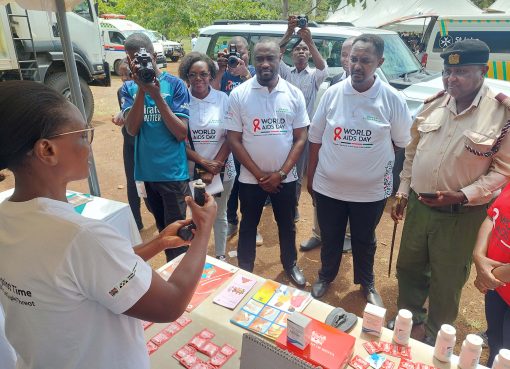Health care workers in West Pokot County and partners supporting health and nutrition in the region have laid down strategies on how health and nutrition can be improved in the region through increasing access and demand for quality health care and nutrition interventions at facility and community levels.
The Malezi Bora programme is an initiative to communicate messages on the utilisation of health services in Kenya. It occurs twice a year, in May and November, but sometimes the one that happens in May spills over to June and the one for November spills over to December, as explained by West Pokot sub-county medical officer of health, Dr Solomon Kokwo.
Speaking in West Pokot County during the meeting with facility in-charges and Community Health Workers (WHWs) together with partners supporting health and nutrition in the county, Dr Kokwo disclosed that 52 health facilities and 15 sub-health management teams with partners supporting health and nutrition have devised innovative approaches on how the health of women, children, and girls of age between 10 and 14 years can be improved through the Malezi Bora programme.
“The county is partnering with key stakeholders in maternal and child health and nutrition, and we have laid down strategies on how we can increase social mobilisation for mother and child nutrition services in the county,” said Dr. Kokwo.
He went on: “We want to increase access to health care services in the facilities and increase caregiver participation in the health facilities across the county.”
He said health care providers have been asked to accelerate the uptake of mother-child health and nutrition services delivery and management in their various health facilities across the county and improve nutrition outcomes for patients.
Dr Kokwo said they have also tasked the health care workers to take the health care services where the people are because most of the country’s facilities are still far apart and not yet within the six-kilometer range according to the World Health Organization’s (WHO) recommendation.
“We intend to reach the unreachable: lactating women, children under five, women of productive age, and expectant women,” he disclosed.
He said essential drugs have been distributed for expectant, lactating women, children under five, and women of reproductive age across the county, and health workers are expected to deliver medical services to the needy courtesy of the government.
He urged the health workers to sensitize the community to stop the practices that could be impeding women’s access to sexual and reproductive health care services.
He said the health department team wants to ensure the full cooperation of Community Health Volunteers (CHVs) in their respective health facilities as a way of strengthening and accelerating health development at all levels and across the county.
Dr Kokwo called for periodic meetings to monitor and review data on progress gained as advocacy is carried out with the aim of improving health services for women and children.
West Pokot Sub County Nutrition Coordinator Isaac Lopeli reiterated that the health department, together with partners, wants to improve maternal, perinatal, infant, and childhood mortality and morbidity health care services in the county.
“Reproductive health and the psychosocial health development of the child, adolescent, woman, and pregnant women are paramount, and a lot of health care attention needs to be addressed,” he highlighted.
Lopeli noted that health workers have been given updates with a focus on immunization intervention, vitamin A supplementation for children aged between 6 and 59 months, growth monitoring, treatment of minor illnesses, and behaviour change communication.
“I want to accelerate the uptake of vitamin A supplementation, the deworming of children, and the treatment of bed nets,” he said.
He explained that a vitamin A supplement is an immune booster and helps reduce the risk of child mortality, morbidity, and malnutrition.
“We urge caregivers to accelerate vitamin A supplementation and deworming for children aged between 6 and 59 months,” he said.
He said they will be vaccinating girls aged 10 to 14 with the Human Papillomavirus (PHV) vaccine, which helps prevent diseases like cervical cancer.
He further said that health care workers have also received a vitamin A monitor chart and a deworming chart for tracking progress on how children have been supplemented.
“The health department expects the routine health services to continue and also outreach services to be offered, especially supplementation, at ECDE centres in hard-to-reach areas to be reached with medical services,” he highlighted.
He said in the year 2022, the number of children that were at risk of stunting stood at 34% in the county, down from 45.9% in the year 2014, according to the Kenya Demographic and Health Survey (KDHS).
He said the county government, through the ministry of health, is appreciating partners for their kind support in the health programs, initiatives, and projects they are undertaking in the county.
He added that they have a lot of commitment from partners on matters of nutrition at the county, including the Africa Medical Research Foundation (AMREF) and Action Against Hunger (ACF), among other stakeholders who have offered to support the health department.
By Anthony Melly




